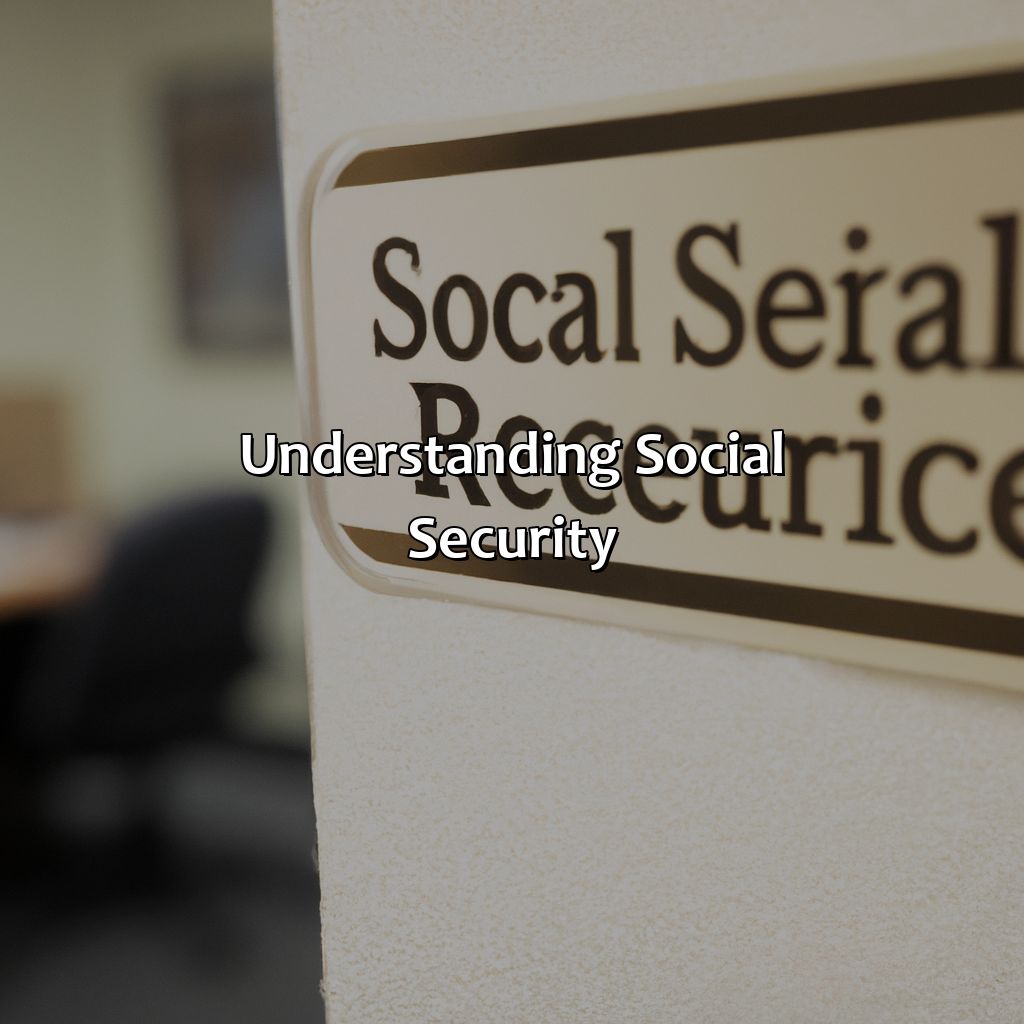Why Am I Paying Social Security If I Don’T Get It?
Key Takeaway:
- Social Security is an important program that provides financial assistance to millions of Americans, particularly seniors and people with disabilities, helping them maintain a basic standard of living.
- Employees and employers each pay a percentage of an employee’s income into the Social Security trust fund, which is used to pay benefits to eligible recipients and maintain the program’s solvency.
- Not everyone qualifies for Social Security benefits, as eligibility is based on a variety of factors, including work credits, age, and disability status. It is important to understand the requirements and reasons for not qualifying to plan for retirement and ensure financial stability.
Are you concerned about the money you’re paying into Social Security without being able to access it? Learn why you’re paying Social Security and what benefits you’ll receive when you do retire.
Understanding Social Security
Want to know what Social Security is and how it works? We got you covered! Check out our two sections – “What is Social Security?” and “How Social Security Works”. They’ll provide you with all the info you need for a comprehensive understanding of this program and its benefits.

Image credits: retiregenz.com by Harry Duncun
What is Social Security
Social Security is a government program designed to provide financial assistance to individuals who are retired, disabled or have lost their income due to unforeseen circumstances. This program is funded through payroll taxes paid by both employees and employers. It serves as a social safety net for those unable to support themselves and their families financially.
One of the main benefits of Social Security is retirement benefits, which are available to individuals who have contributed enough payroll taxes and have reached retirement age. In addition, Social Security provides disability benefits if an individual is unable to work for at least one year due to a medical condition. Finally, it also provides survivor benefits if an individual dies and leaves behind dependents.
What many people do not realize is that even if they are not currently receiving any Social Security benefits, their contributions are still helping others receive those benefits. Additionally, it’s important to note that Social Security benefits are adjusted based on wage increases over time.
It’s essential that everyone contributes to Social Security as it ensures continued assistance for those in need and helps maintain economic stability. Don’t miss out on this crucial social safety net by neglecting your responsibility to pay into the system.
Understanding how Social Security works is like trying to decipher a complex riddle with no clear solution – good luck with that!
How Social Security works
Social Security is a government-run program designed to provide financial support to individuals who have reached retirement age or are disabled. The system works by collecting taxes from current workers, which are then used to pay benefits to retired or disabled individuals. These taxes are held in a trust fund and invested in bonds, which grow over time. When an individual reaches retirement age or becomes disabled, they are entitled to receive benefits from the trust fund based on their work history and contributions.
The amount of Social Security benefits you receive is based on your lifetime earnings record. The more you earn and contribute, the higher your benefit will be. However, even if you do not currently receive Social Security benefits, it is still important to pay into the system because it ensures that funds will be available when you reach retirement age or if you become disabled.
It’s also worth noting that some individuals may not qualify for Social Security benefits due to factors such as a lack of sufficient work history or certain immigration statuses. However, paying into the system can still provide eligibility for other programs such as Medicare.
In order to ensure that you are properly contributing and keeping track of your potential future benefits, it’s crucial to regularly review your Social Security statement and understand how the program works.
Make sure you don’t miss out on potential Social Security benefits by understanding how the program works and staying informed about any changes or updates to the system. Don’t wait until it’s too late – start planning for your financial future today.
Why not just call it ‘Old Age Gambling’ and be done with it?
Why do I pay for Social Security?
To grasp the significance of Social Security payments, one needs to study its breakdown. This involves analyzing the advantages it offers. It is also vital to comprehend the value of Social Security and how it aids millions of Americans in their retirement.

Image credits: retiregenz.com by James Washington
Importance of Social Security
Social Security plays a crucial role in securing your financial future and providing you with a stable source of income during retirement years. This program is a safety net that protects individuals from poverty, disability and even death.
By contributing to Social Security through regular paychecks, you are essentially investing in your own future. The benefits received are based on the number of credits earned over the years while working. These credits represent the required minimum contributions made to Social Security.
In addition to retirement benefits, qualifying for disability insurance ensures continuous income when unable to work due to ill health or disability. This program also extends support to family members in case of personal injury or death.
Many Americans rely on their Social Security benefits as their primary source of retirement income. It is important to understand how much we need for our retirement goals and plan accordingly.
A True History: Since the inception of this program, millions have benefited from it making it one of the most successful social welfare programs in American history. In 2019 alone, over 64 million individuals were recipients of Social Security benefits including retired workers, spouses, children and survivors.
Breaking down my Social Security payments is like trying to break down a brick wall with a toothpick.
Payment breakdown
The clarification of “Why do I pay for Social Security?- why am i paying social security if i don’t get it?” can be explained as the payment breakdown of Social Security benefits and contributions.
A table presenting the payment breakdown would first have columns for current tax rates. In 2021, wage earners contribute 6.2% of their earnings up to $142,800 towards Social Security taxes, while their employers match this contribution at an additional 6.2%. Self-employed individuals must cover both portions themselves with a total contribution of 12.4% of their income.
Next, the payment allocation columns would showcase the distribution between benefits programs such as retirement, disability and survivorship. Based on a worker’s average lifetime earnings, the payout amount varies with no fixed date for receiving service compensation.
It is important to note that some government employees or self-employed individuals may not receive benefits under various situations such as inadequate years of employment or sufficient earning requirements were not met.
Social Security is designed to assist wage earners in retirement and other situations by providing financial assistance through taxes across a lifetime.
Why did the Social Security benefits say ‘see ya later’ to me? Apparently, they didn’t find my sense of humor retirement-plan-worthy.
Why don’t I receive Social Security benefits?
Why aren’t you receiving Social Security benefits? To know, first figure out the requirements. If they’re not met, there could be a variety of explanations. So, we’ll check these sub-sections. That way, you may understand why you’re not getting Social Security benefits.

Image credits: retiregenz.com by David Jones
Requirements for receiving benefits
To receive Social Security benefits, certain conditions must be met. These circumstances are based on your age, work history, and disability status. Here’s what you need to know:
- You must have worked and paid into the Social Security program for a minimum of ten years.
- You must have reached a certain age to be eligible for retirement benefits. This age varies depending on the year you were born.
- If you’re disabled, you must meet specific medical criteria defined by the Social Security Administration to qualify for benefits.
- Your family members may also be entitled to benefits if they meet specific requirements.
It’s essential to remember that these requirements are in place to ensure that only those who’ve contributed enough and met specific qualifications reap the rewards of the Social Security program.
It would help if you also kept in mind that there are several programs available from the Social Security Administration besides retirement benefits, such as disability insurance and survivor benefits.
If only Social Security was like a participation trophy, we’d all be winners. But alas, eligibility requirements exist.
Reasons for not qualifying
Social Security benefits are not received by everyone who pays into the system. Eligibility requirements vary, but common reasons include not working enough years to accumulate enough credits, earning too much income to be eligible, and not applying for benefits at the appropriate time. Additionally, certain groups such as undocumented immigrants and some government employees may be excluded from receiving Social Security benefits. It is important to understand these eligibility requirements and factors before expecting to receive Social Security benefits.
Furthermore, it is important to note that while paying into Social Security may seem like a burden for those who will never receive benefits, it serves as a safety net for elderly and disabled citizens who rely on these funds. Additionally, survivors of deceased workers may also be eligible for Social Security benefits. Thus, even if an individual does not personally qualify for benefits, understanding the importance of contributing to the system can help support those in need.
Moreover, it should be noted that eligibility requirements are subject to change based on legislation and other economic factors. Therefore, staying up to date on changes in Social Security policies can help individuals understand their potential eligibility.
For example, John worked for several years but did not earn enough credits to qualify for Social Security benefits. However, after learning about the work credit system and his options for supplementing his retirement income through other means such as a retirement savings plan or pension, John was able to financially prepare for his retirement without relying solely on Social Security benefits.
Some Facts About “Why Am I Paying Social Security If I Don’t Get It?”:
- ✅ Social Security taxes fund benefits for current retirees, survivors, and disabled people, not for future generations. (Source: Social Security Administration)
- ✅ Eligibility for Social Security benefits is based on work credits earned over a person’s lifetime. (Source: AARP)
- ✅ Social Security benefits are progressive, meaning lower-income workers receive a higher percentage of their pre-retirement income than higher-income workers. (Source: Center on Budget and Policy Priorities)
- ✅ Social Security benefits are subject to income taxes for some individuals, depending on their income level. (Source: Internal Revenue Service)
- ✅ The Social Security trust fund is projected to be depleted by 2034 unless Congress takes action to address the program’s funding shortfall. (Source: Social Security Administration)
FAQs about Why Am I Paying Social Security If I Don’T Get It?
Why am I paying social security if I don’t get it?
Even if you are not receiving social security benefits now, your contributions help fund the program for others and for when you may become eligible in the future.
Can I opt-out of paying social security?
No, social security taxes are mandatory and cannot be opted out of, except in specific exemption cases like certain religious groups or individuals with foreign government retirement plans.
What if I never become eligible for social security benefits?
If you do not meet the eligibility criteria for social security benefits, such as not having enough work credits or not being 62 years old, your contributions remain in the social security trust fund for future beneficiaries.
What other benefits can I get from social security besides retirement benefits?
Social security also offers disability benefits, survivor benefits, and Medicare health insurance coverage for those over 65, among other programs.
How are my social security benefits calculated?
Your social security benefits are calculated based on your average earnings over your lifetime, adjusted for inflation, and your eligibility age for benefits.
If I continue working, will my social security benefits increase?
Your benefit amount may increase if you continue working and earning higher wages, as it will increase your average lifetime earnings used in the benefit calculation. However, there is also a maximum limit on how much you can receive in social security benefits regardless of your earnings.


